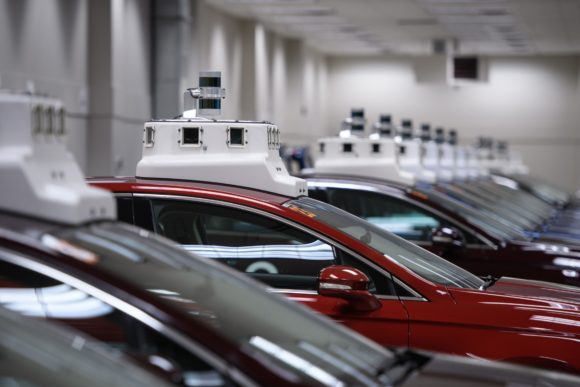Michigan announced an initiative to explore development of a more than 40-mile stretch of road dedicated to connected and autonomous vehicles between the cities of Ann Arbor and Detroit.
The project will be led by Cavnue, a subsidiary of Sidewalk Infrastructure Partners, and will be supported by an advisory committee that includes General Motors Co., Ford Motor Co. and Toyota Motor Corp., as well as autonomous driving statups Argo AI and Alphabet Inc.’s Waymo.
“We are taking the initial steps to build the infrastructure to help us test and deploy the cars of the future,” Michigan Governor Gretchen Whitmer said in a statement.
Michigan said the dedicated AV corridor is the first of its kind and eventually will improve safety and transit access for communities along the road. The first two years of the project will focus on testing technology and exploring the viability of a highway dedicated to vehicles that drive themselves.
The goal would be to create a corridor “that allows for a mix of connected and autonomous vehicles, traditional transit vehicles, shared mobility and freight and personal vehicles,” the state said in the statement.
Most of the U.S. testing by leading autonomous-vehicle companies to date has taken place in California, with GM-backed Cruise, Waymo and Amazon-owned Zoox deploying their fleets in San Francisco and the Bay Area. In most cases, a safety driver is required, and the AVs share the road with regular traffic. Waymo also does a lot of driverless testing in Arizona.
“Testers in Michigan do not face the heavy reporting burden faced by those in California, making the state an ideal place for testing without much public scrutiny,” Bloomber NEF analyst Alejandro Zamorano-Cadavid said. “Given the auto-tech cluster already in Michigan, it makes sense for the state to provide a corridor that will help its biggest industry adapt to a world with less cars and increasingly more shared autonomous vehicles.”
BloombergNEF sees sales of passenger vehicles peaking globally in 2036 as shared car fleets and robotaxi fleets grow. Still, it notes there’s a high degree of uncertainty around the timing and deployment of autonomous vehicles.
Was this article valuable?
Here are more articles you may enjoy.


 Cape Cod Faces Highest Snow Risk as New Coastal Storm Forms
Cape Cod Faces Highest Snow Risk as New Coastal Storm Forms  Canceled FEMA Review Council Vote Leaves Flood Insurance Reforms in Limbo
Canceled FEMA Review Council Vote Leaves Flood Insurance Reforms in Limbo  Tesla Sued Over Crash That Trapped, Killed Massachusetts Driver
Tesla Sued Over Crash That Trapped, Killed Massachusetts Driver  Elon Musk Alone Can’t Explain Tesla’s Owner Exodus
Elon Musk Alone Can’t Explain Tesla’s Owner Exodus 